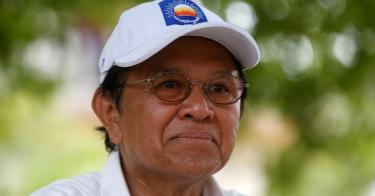In another strike against Cambodian democracy, opposition leader Kem Sokha was arrested on Sept. 2 on charges of treason for allegedly plotting to overthrow the Cambodian government.
Kem Sokha’s imprisonment may foreshadow things to come.
Cambodia is set to hold elections in July 2018 – elections that may threaten the 32-year reign of Prime Minister Hun Sen. The despotic leader has a long record of quashing opposition and silencing alternative voices ahead of elections. As if on cue, he is at it again.
In addition to charging Kem Sokha, Hun Sen and his cronies are attempting to silence the media. They have shut down The Cambodia Daily, alleging that the English language newspaper had engaged in tax evasion. The government has gone after other independent newspapers and radio stations—including Radio Free Asia and Voice of America—as well as independent television stations.
Certainly Hun Sen is making no secret of his intention to hold onto the reins of power, whatever it takes. The New York Times quotes him as saying: “After witnessing the treasonous acts of some Cambodians in recent days, I have decided to continue my job for another 10 years.”
In other words, despite scheduled elections in 2018, Hun Sen has decided that he will rule for many years to come. The will of the Cambodian people won’t matter. Hun Sen’s is the only will that counts.
The government’s arrest of Kem Sokha, president of the Cambodia National Rescue Party (CNRP), was foreshadowed months ago. In May 2016, security forces tried to arrest him as was registering to vote, forcing him to hole up under de facto house arrest at CNRP headquarters. The government forced Kem Sokha’s predecessor, Sam Rainsy, to flee the country on multiple occasions. In February, Rainsy left Cambodian politics and the country for good, after leading the opposition for years.
Hun Sen has been worried about the opposition since the 2013 elections. It was the first time in a long while that his organization, the Cambodian People’s Party, was seriously challenged in an election cycle. Targeting opposition leaders, restricting freedom of assembly, and silencing opposition media voices were all part of Hun Sen’s election playbook that year.
Four years on, the mirage of Cambodian democracy is shattering. The reality is that it has been shattered for a long time. After Cambodia declared its desire to reform in the 1990s, the U.S. and other international actors—including Japan, Indonesia, Australia, the United Kingdom, and France—signed the Paris Peace Accords. All agreed to hold Cambodia to account if it should start to backslide on its march to democracy.
Today, Cambodia is beyond backsliding. Hun Sen is driving it in reverse. The treaty signatories have a clear responsibility to hold the regime accountable for its actions.
In the U.S., a move is afoot to do just that. Last week, the Senate proposed restricting all funds otherwise appropriated for Cambodia in S. 1780 – the State, Foreign Operations, and Related Programs bill. The proposal would make some funding contingent on the Cambodian government’s willingness to stop targeting civil society and opposition leaders. The regime would also have to demonstrate commitment and capacity to holding free and fair elections.
More can be done, too. Ahead of 2018 elections, the U.S. should also re-form a Cambodia contact group to devise a plan to help Cambodia find its way back to a path to reform. For freedom in Cambodia, and in defense of Kem Sokha, the U.S. should make clear now its commitment to a democratic Cambodia.
This piece originally appeared in Forbes



